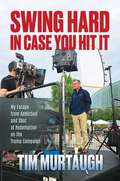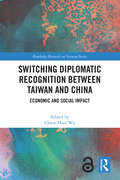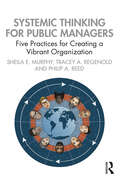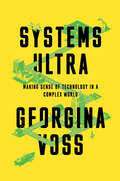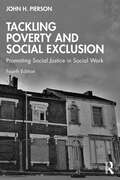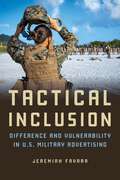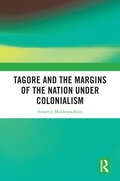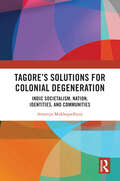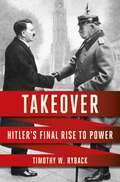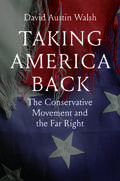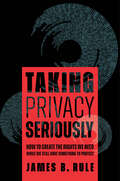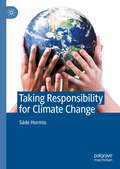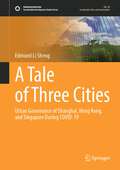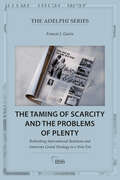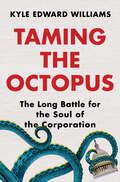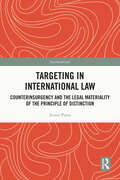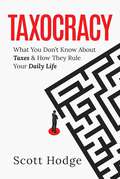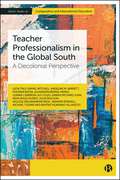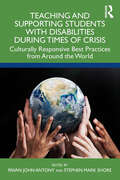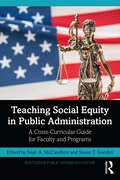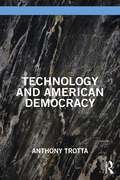- Table View
- List View
Swing Hard in Case You Hit It: My Escape from Addiction and Shot at Redemption on the Trump Campaign
by Tim MurtaughFrom waking up in jail to flying on Air Force One less than four years later, this is the story of Tim Murtaugh&’s journey from desperate alcoholism to the top of the political world on the 2020 Trump campaign.When he woke up in jail in Fairfax County, Virginia, in 2015, Tim Murtaugh had no way of knowing he&’d be a senior leader on the reelection campaign for the president of the United States less than four years later.What began as a form of high-school amusement quickly became an addiction, which over decades would lead Murtaugh to the edge of ruin. Able to beat the disease of alcoholism only under the threat of losing everything, and with the support of a loving wife and family, Murtaugh managed to recover, revive his career, and make it to the top of the political world.Travel along on the 2020 Trump campaign as Murtaugh shares stories—never published before—from his two years as communications director, navigating a hostile media, the COVID-19 pandemic, highly anticipated debates, Election Day 2020, January 6, and life on the most-watched political campaign in world history.Swing Hard in Case You Hit It is a redemption story unlike any other—from being on the verge of complete self-destruction to flying on Air Force One with President Donald J. Trump—that doesn&’t come with a happy Hollywood ending
Switching Diplomatic Recognition Between Taiwan and China: Economic and Social Impact (Routledge Research on Taiwan Series)
by Wu, Edited by Chien-HueiThis book examines the economic and social impacts of switching diplomatic relations from Taiwan to China, and vice versa, and investigates how China achieves its foreign policy objective of dissuading Taiwan’s diplomatic partners and other third parties from engaging with Taiwan.Highlighting the critical regions of Africa, Latin America and the Caribbean, and Oceania, where the diplomatic competition between Taiwan and China is fierce, the contributions to this book analyze China’s promises of economic benefits, threats of economic coercion and the perils of its foreign aid to the countries in these regions in pursuit of its anti-Taiwan policy. In addition to the competition of formal diplomatic ties, it also examines how existing informal relations have influenced Taiwan’s increasing interactions with Central and Eastern European countries. Finally, the book explores how Taiwan’s advantage in technology sectors has successfully been translated into economic leverage for Taiwan’s international diplomacy.Built upon the interdisciplinary expertise and collaborative efforts of 14 international scholars, this book will be a valuable resource to scholars and students of Taiwan studies, China studies and international relations.
Systemic Thinking for Public Managers: Five Practices for Creating a Vibrant Organization
by Sheila Murphy Tracey Regenold Philip ReedOffering a pathway to vibrant organizations, this book integrates systems thinking, critical thinking, and design thinking, and provides the tools needed to proactively apply them in the social systems where we live and work. Systemic thinking—the combination of systems thinking, critical systems thinking, and design thinking—provides a way of addressing the complexity of problems faced by public sector managers. Far too often systemic thinking has been discussed theoretically rather than practically. This book changes that, enabling public sector managers and leaders to connect staff, partners, and stakeholders in the pursuit of thoughtfully designed and responsive service. Clearly written and designed to be put to immediate use on the job, each chapter provides a discussion of one specific practice. Included are guiding principles, a case study, relevant practical tools, and suggestions of for additional practice and reading.Using this book, managers of social systems such as public welfare, healthcare, public schools and libraries, housing and community development, and students of public administration will gain a deeper understanding of organizational systems and design, and a new toolkit to fortify their own organizations.
Systems Ultra: Making Sense of Technology in a Complex World
by Georgina VossA TOOLBOX FOR COMPREHENDING — AND CHANGING — THE WORLDSystems Ultra explores how we experience complex systems: the mesh of things, people, and ideas interacting to produce their own patterns and behaviours.What does it mean when a car which runs on code drives dangerously? What does massmarket graphics software tell us about the workplace politics of architects? And, in these human-made systems, which phenomena are designed, and which are emergent? In a world of networked technologies, global supply chains, and supranational regulations, there are growing calls for a new kind of literacy around systems and their ramifications. At the same time, we are often told these systems are impossible to fully comprehend and are far beyond our control.Drawing on field research and artistic practice around the industrial settings of ports, air traffic control, architectural software, payment platforms in adult entertainment, and car crash testing, Georgina Voss argues that complex systems can be approached as sites of revelation around scale, time, materiality, deviance, and breakages. With humour and guile, she tells the story of what &‘systems&’ have come to mean, how they have been sold to us, and the real-world consequences of the power that flows through them.Systems Ultra goes beyond narratives of technological exceptionalism to explore how we experience the complex systems which influence our lives, how to understand them more clearly, and, perhaps, how to change them.
Tackling Poverty and Social Exclusion: Promoting Social Justice in Social Work
by John H. PiersonIn highly unequal Britain, poverty and social exclusion continue to dominate the lives of users of social work and social care services. At the same time, years of austerity combined with welfare reform have changed the context in which services are delivered in a society roiled by Brexit, Covid, Black Lives Matter and women rallying under the banner, “Me‑too”.This fourth edition lays out the ways and means for practitioners to tackle the deprivation and destitution of service users. Fully revised and expanded, it introduces new material that tracks changes and developments in policy and practice. Statutes, benefit rules and relevant research are discussed as part of the necessary knowledge base for practitioners. Greater attention than in previous editions is paid to: local authority commissioning, the impact of social media on the mental health of young people, substandard housing and working with transgender youth.Preparing practitioners to engage directly with the social and personal circumstances facing excluded individuals and their families, this book explains the development of the concept of social exclusion as a framework for understanding the impact of poverty and other deprivations in users’ lives, and locates that framework within social work values of social justice while acknowledging the many challenges to those values. The focus is on practice throughout with boxed extracts from key policies and guidelines along with questions for readers to ponder through up‑to‑date examples, activities and exercises in each chapter. Case studies from public, private and voluntary sectors are drawn from across the United Kingdom, to illuminate the way forward for poverty‑aware social work.Tackling Poverty and Social Exclusion will be required reading for all BA and MA social work degrees across the United Kingdom.
Tactical Inclusion: Difference and Vulnerability in U.S. Military Advertising (Feminist Media Studies)
by Jeremiah FavaraThe revolution in military recruitment advertising to people of color and women played an essential role in making the US military one of the most diverse institutions in the United States. Starting at the dawn of the all-volunteer era, Jeremiah Favara illuminates the challenges at the heart of military inclusion by analyzing recruitment ads published in three commercial magazines: Sports Illustrated, Cosmopolitan, and Ebony. Favara draws on Black feminism, critical race theory, and queer of color critique to reveal how the military and advertisers affected change by deploying a set of strategies and practices called tactical inclusion. As Favara shows, tactical inclusion used representations of servicemembers in the new military to connect with people susceptible to recruiting efforts and rendered these new audiences vulnerable to, valuable to, and subject to state violence. Compelling and eye-opening, Tactical Inclusion combines original analysis with personal experience to chart advertising’s role in building the all-volunteer military.
Tagore and the Margins of the Nation under Colonialism
by Amartya MukhopadhyayThis book focuses on India’s anti-colonial politics which Rabindranath Tagore (1861–1941) brought into the mainstream of nationalist thinking. It browses through the entire corpus of Tagore’s writings in the genres of poetry, fiction, and essays, to glean both used and hitherto unused/un-translated writings that illumine Tagore’s gender consciousness and (proto)feminist thought and empathy, presenting it in a wholly new light. It teases out Tagore’s original views on India’s industrial-capitalist development and his views on the roles of applied scientists and engineers in it to highlight his critique of the nature of science teaching in colonial India. The volume also delineates Tagore’s Upanişadic ecologism that creatively evoked anticolonialism and patriotism. Lucid and topical, the book will be indispensable for students and researchers in the fields of comparative literature, history, political science, international relations, and sociology at all levels, and anybody interested in literary criticism and cultural studies.
Tagore’s Solutions for Colonial Degeneration: Indic Societalism, Nation, Identities, and Communities
by Amartya MukhopadhyayThis book focuses on Rabindranath Tagore as a social and political thinker revolving around Tagore’s ideas on the seeds of civil society, nation, identities, and communities in the Indic tradition. The author deconstructs Tagore’s concepts against the appropriate resurgent and triumphalist Western concepts in the updated Western social thought and theories. The book examines Tagore’s understanding of the nature of the civil social sphere in India and analyzes the relevance of his civil social concepts against the backdrop of colonialism in India. It also discusses his views on nation and nationalism in India and his insights into the problems and prospects of intercommunity, particularly Hindu-Muslim relations in India. Applying current social science and Western literature in an unprecedented manner to interpret Tagore, this book will be of great interest to scholars, teachers, and students of politics, nationalism, postcolonialism, history, comparative literature, sociology, religious studies, and South Asian studies.
Takeover
by Timothy W. RybackFrom the internationally acclaimed author of Hitler's Private Library, a dramatic recounting of the six critical months before Adolf Hitler assumed power, when the Nazi leader teetered between triumph and ruin.In the summer of 1932, the Weimar Republic was on the verge of collapse. One in three Germans was unemployed. Violence was rampant. Hitler's National Socialists surged at the polls. Paul von Hindenburg, an aging war hero and avowed monarchist, was a reluctant president bound by oath to uphold the constitution. The November elections offered Hitler the prospect of a Reichstag majority and a path to political power. But instead, the Nazis lost two million votes. As membership hemorrhaged and financial backers withdrew, the Nazi Party threatened to fracture. Hitler talked of suicide. The New York Times declared he was finished. Yet somehow, in a few brief weeks, he was chancellor of Germany.In fascinating detail and with previously un-accessed archival materials, Timothy W. Ryback tells the remarkable story of Hitler's dismantling of democracy through the democratic process. He provides a fresh perspective and insights into Hitler's personal and professional lives in these months, in all their complexity and uncertainty-backroom deals, unlikely alliances, stunning betrayals, an ill-timed tax audit, and a fateful weekend that changed our world forever. Above all, Ryback makes clear why a wearied Hindenburg, who disdained the "Bohemian corporal," ultimately decided to appoint Hitler chancellor in January 1933.Within weeks, Germany was no longer a democracy.
Takeover: Hitler's Final Rise To Power
by Timothy W. RybackFrom the internationally acclaimed author of Hitler's Private Library, a dramatic recounting of the six critical months before Adolf Hitler assumed power, when the Nazi leader teetered between triumph and ruin.In the summer of 1932, the Weimar Republic was on the verge of collapse. One in three Germans was unemployed. Violence was rampant. Hitler's National Socialists surged at the polls. Paul von Hindenburg, an aging war hero and avowed monarchist, was a reluctant president bound by oath to uphold the constitution. The November elections offered Hitler the prospect of a Reichstag majority and a path to political power. But instead, the Nazis lost two million votes. As membership hemorrhaged and financial backers withdrew, the Nazi Party threatened to fracture. Hitler talked of suicide. The New York Times declared he was finished. Yet somehow, in a few brief weeks, he was chancellor of Germany.In fascinating detail and with previously un-accessed archival materials, Timothy W. Ryback tells the remarkable story of Hitler's dismantling of democracy through the democratic process. He provides a fresh perspective and insights into Hitler's personal and professional lives in these months, in all their complexity and uncertainty-backroom deals, unlikely alliances, stunning betrayals, an ill-timed tax audit, and a fateful weekend that changed our world forever. Above all, Ryback makes clear why a wearied Hindenburg, who disdained the "Bohemian corporal," ultimately decided to appoint Hitler chancellor in January 1933.Within weeks, Germany was no longer a democracy.
Taking America Back: The Conservative Movement and the Far Right
by David Austin WalshA provocative look at the relationship between the far right and the American conservative movement from the 1930s to the end of the Cold War Since 2016, many commentators have expressed shock at the so-called rise of the far right in America at the expense of "responsible" and "respectable" conservatism. But is the far right an aberration in conservative politics? As David Austin Walsh shows, the mainstream conservative movement and the far right have been intertwined for nearly a century, and both were born out of a "right-wing popular front" linking racists, anti-Semites, and fascists in a broad coalition opposed to socialism, communism, and New Deal liberalism. Far from being outliers in the broader conservative coalition, these extremist elements were foundational in the creation of a right‑wing political culture centered around shared political enemies, a penchant for conspiracy theories, and a desire to restore America to its "authentic" pre–New Deal values. The popular front included Merwin Hart, a New York business lobbyist active in far-right circles who became a lobbyist for the Franco regime in Spain, the original "America First" movement, the movement to prevent Jewish immigration to the United States after World War II, the John Birch Society, the American Nazi Party, the George Wallace presidential campaign of 1968, the fight over the National Endowment for the Humanities, and Pat Buchanan’s support of Nazi war criminal John Demjanjuk during the Reagan Administration. And connecting this disparate coalition was William F. Buckley, Jr., the editor of National Review and America’s leading "responsible conservative.&rdquo
Taking Privacy Seriously: How to Create the Rights We Need While We Still Have Something to Protect
by James B. RuleOther books remind us of what we already know—that privacy is under great pressure. James Rule provides a step-by-step plan to create a significantly more private and authentically democratic world. Taking Privacy Seriously offers both a concise, hard-hitting assessment of the origins of today’s privacy-eroding practices and a roadmap for creating robust new individual rights over our personal data. Rule proposes eleven key reforms in the control and use of personal information, all aimed at redressing the balance of power between ordinary citizens and data-hungry corporate and government institutions. What a privacy-deprived America needs most is not less technology, Rule argues, but profound political realignment. His eleven proposed reforms range from launching a major public-works investment consisting of a series of websites publicly documenting the personal data uses of nearly all government and private institutions; to instating a right for any citizen to withdraw from any personal data system not required by law; to creating a universal property right over commercial exploitation of data on oneself—so that no company or other organization could profit from use or sale of such data without permission. Succinct and compelling, Taking Privacy Seriously explains how we can refashion information technologies so that they serve human needs, not the other way around.
Taking Responsibility for Climate Change
by Säde HormioThis book proposes that it is not only states and international bodies that have a responsibility to take action toward mitigating climate change. Other collective agents, such as corporations, need to also come onboard. Additionally, the book argues that climate change is not solely a problem for collective agents, but also for individuals, as they are members of collectives and groups of several kinds. Therefore, framing climate change responsibility exclusively from either the collective or the individual perspective leaves out something crucial: how we all are influenced by the collectives we belong to and how, in turn, collectives are influenced by individuals. The focus of the book is on areas of climate change responsibility that are often left out of the picture or get too little attention in climate ethics, such as carbon inequality within countries. But why should any theoretical arguments about normative issues matter when we have a real-life climate crisis on our hands? Säde Hormio argues that ethical arguments have an important role in setting climate policy: they can highlight what values are at stake and help ground normative arguments in public deliberations.
A Tale of Three Cities: Urban Governance of Shanghai, Hong Kong, and Singapore During COVID-19 (Sustainable Development Goals Series)
by Edmund Li ShengThe proposed book presents the cutting-edge research on the urban development of three cities: Shanghai, Hong Kong, and Singapore. By comparing their responses to the COVID-19 pandemic from an international political economic perspective, this book examines the commonalities and differences in urban governance in these three widely recognized and well-developed Asian cities with outward-oriented economies through the lens of world-systems theory and related theories of historicism. These cities are all generally considered to be under authoritarian regimes, but there are substantial differences in their social systems, rules of law and justice, and administrative structures. In the context of globalization, the cities are competing on a more even playing field. In addition, city governments worldwide are increasingly pursuing growth, land markets, urban regeneration, and large-scale public projects. With the advent of globalization, urban development is gradually changing from the past crude model of spatial expansion and land finance to a more refined model of socioeconomic development driven by industrial upgrading and enhanced consumption. However, cities’ political and economic contexts and governance systems vary greatly. Unsurprisingly, given their differences, the three cities of Shanghai, Hong Kong, and Singapore demonstrated varied responses to the COVID-19 pandemic. This book discusses the efforts of these governments to address and reduce the spread of COVID-19 as well as how national responses to the pandemic outbreak were influenced by global dynamics, geopolitics, and each nation’s particular historical context.
The Taming of Scarcity and the Problems of Plenty: Rethinking International Relations and American Grand Strategy in a New Era (ISSN)
by Francis J. GavinThe underlying structure, incentives and costs shaping international relations, state behaviour and the nature of power are profoundly different today to how they were in the past, in ways that are scarcely recognised and widely misunderstood. For much of history, world politics was marked by profound scarcity in resources, information and security. A series of historical revolutions has largely tamed this scarcity in ways few could have imagined. These revolutions, however, have generated new, potentially catastrophic challenges for the world – the problems of plenty.In this Adelphi book, Francis J. Gavin argues that the institutions, practices, theories and policies that helped explain and largely tamed scarcity by generating massive prosperity, and which were sometimes used to justify punishing conquest, are often unsuitable for addressing the problems of plenty. Successful grand strategy in this new age of abundance requires new thinking. New conceptual lenses, innovative policies and processes, and transformed institutions will be essential for confronting and solving the problems of plenty, without undermining the expanding efforts against scarcity.
Taming the Octopus: The Long Battle for the Soul of the Corporation
by Kyle Edward WilliamsThe untold story of how efforts to hold big business accountable changed American capitalism. Recent controversies around environmental, social, and governance (ESG) investing and “woke capital” evoke an old idea: the Progressive Era vision of a socially responsible corporation. By midcentury, the notion that big business should benefit society was a consensus view. But as Kyle Edward Williams’s brilliant history, Taming the Octopus, shows, the tools forged by New Deal liberals to hold business leaders accountable, such as the Securities and Exchange Commission, narrowly focused on the financial interests of shareholders. This inadvertently laid the groundwork for a set of fringe views to become dominant: that market forces should rule every facet of society. Along the way, American capitalism itself was reshaped, stripping businesses to their profit-making core. In this vivid and surprising history, we meet activists, investors, executives, and workers who fought over a simple question: Is the role of the corporation to deliver profits to shareholders, or something more? On one side were “business statesmen” who believed corporate largess could solve social problems. On the other were libertarian intellectuals such as Milton Friedman and his oft-forgotten contemporary, Henry Manne, whose theories justified the ruthless tactics of a growing class of corporate raiders. But Williams reveals that before the “activist investor” emerged as a capitalist archetype, Civil Rights groups used a similar playbook for different ends, buying shares to change a company from within. As a rising tide of activists pushed corporations to account for societal harms from napalm to environmental pollution to inequitable hiring, a new idea emerged: that managers could maximize value for society while still turning a maximal profit. This elusive ideal, “stakeholder capitalism,” still dominates our headlines today. Williams’s necessary history equips us to reconsider democracy’s tangled relationship with capitalism.
Targeting in International Law: Counterinsurgency and the Legal Materiality of the Principle of Distinction (Interventions)
by Amin ParsaThis book is about how distinctions are drawn between civilians and combatants in modern warfare and how the legal principle of distinction depends on the technical means through which combatants make themselves visibly distinguishable from civilians. The author demonstrates that technologies of visualisation have always been part of the operation of the principle of distinction, arguing that the military uniform sustained the legal categories of civilian and combatant and actively set the boundaries of permissible and prohibited targeting, and so legal and illegal killing. Drawing upon insights from the theory of legal materiality, visual studies, critical fashion studies, and a dozen of military manuals he shows that far from being passive objects of regulation, these technologies help to draw the boundaries of the legitimate target. With its attention to the co-productive relationship between law, technologies of visualisation and legitimation of violence, this book will be relevant to a large community of researchers in international law, international relations, critical military studies, contemporary counterinsurgency operations and the sociology of law.
Taxocracy: What You Don't Know About Taxes and How They Rule Your Daily Life
by Scott HodgeTaxocracy: What You Don&’t Know About Taxes and How They Rule Your Daily Life won&’t help you lower your tax bill, but it will help you understand how politicians use taxes to influence our lives, how taxes harm the economy, and why we need a simpler tax system.Did you ever wonder why the costs of health care, housing, and college tuition keep going up? Or how your neighbor could afford that fancy electric car? Or why there are so many hard seltzers on the market? Your first guess might not be &“taxes,&” but they play a big role. We live in a world ruled by taxes—a taxocracy. History is full of misguided tax policies that led to &“see-through&” buildings, tax-free attics, three-wheeled cars, women in children&’s clothing, and baked chips to go along with our hard seltzer. Written by former Tax Foundation CEO Scott Hodge, Taxocracy: What You Don&’t Know About Taxes and How They Rule Your Daily Life uses amusing lessons from past tax policies gone wrong to explore how the US tax code caused serious consequences, affecting how we get our health insurance, the price of a college education, what car we buy, where we bank, and, in some cases, even when we die. Taxocracy outlines economic principles for designing a tax code that doesn&’t rule our daily lives—a tax code that promotes economic growth, free-enterprise, and takes the politics out of tax policy.
Teacher Ethics and Teaching Quality in Scandinavian Schools: New Reflections, Future Challenges, and Global Impacts (Routledge Research in Teacher Education)
by Lars Emmerik Damgaard Knudsen Merete Wiberg Karen Bjerg Petersen Lisbeth HaastrupThis edited volume explores the idea that educational success in Scandinavian countries can be attributed to the inherent connectedness of teacher ethics and teaching quality, providing inspiration to teachers and school systems outside Scandinavia. Acknowledging that Scandinavian school systems are known for mirroring the welfare systems and democratic societies with respect for both institutions and individuals, this book explores new educational demands, possibilities, and research developments taking place in Scandinavian countries such as Denmark, Norway, and Sweden that place the education system, and teachers’ professional development and identities, under pressure. Chapters address teacher ethics and quality in relation to topics such as the dialogical teacher, democratic teaching, parental collaboration, and the ethics of classroom management to inform non-Scandinavian, international school systems and teacher education initiatives. Discussing current developments in the Scandinavian school systems and the emerging educational ideas and practices within them, this book will appeal to scholars, researchers, and postgraduate students studying teachers and teacher education, moral and values education, and teacher identities more broadly. It will also be useful to policymakers and teacher educators involved with teachers’ professional development more broadly.
Teacher Professionalism in the Global South: A Decolonial Perspective (Bristol Studies in Comparative and International Education)
by Leon Tikly Rafael Mitchell Angeline M. Barrett Poonam Batra Alexandra Bernal Leanne Cameron Alf Coles Zawadi Richard Juma Nidia Aviles Nunez Julia Paulson Nigusse Weldemariam Reda Jennifer Rowsell Michael Tusiime Beatriz VejaranoThis book provides a decolonial critique of dominant global agendas concerning teacher professionalism and proposes a new understanding based on UNESCO-funded research with teachers based in Colombia, Ethiopia (Tigray), India, Rwanda and Tanzania. Outlining from a teacher’s perspective how teacher professionalism may be conceptualized, this book critiques dominant global narratives and conceptions based on deficit discourses. The authors argue that a decolonial lens can help to contextualize the perspectives, experiences and material conditions of teachers in the global South, and the value of such a framework for informing global debates and decision-making in education.
Teaching and Supporting Students with Disabilities During Times of Crisis: Culturally Responsive Best Practices from Around the World
by Pavan John Antony Stephen Mark ShoreThis volume offers international perspectives on the disproportionate impact COVID-19 has had on disabled students and their families, serving as a call to action for educational systems and education policy to become proactive, rather than reactive, for future disasters. Each chapter in the book is written by authors with lived experiences across diverse global regions, highlighting the daily life of people with disabilities and their families during the pandemic. Including case studies and practical suggestions, the book demonstrates that culturally responsive practices are essential to successfully support people around the world in their times of need. At the critical intersection of education and disability human rights, this book is important for pre-service teachers, researchers, professors, and graduate students to ensure all students are supported during times of crisis.
Teaching Landscape History
by Jan Woudstra David JacquesLandscape history is changing in content and style to address the issues of today. Experienced teachers and authors on the history of gardens and landscapes come together in this new volume to share ideas on the future of teaching history in departments of landscape architecture, archaeology, geography and allied subjects. Design history remains important, but this volume brings to the fore the increasing importance of environmental history, economic history, landscape history, cultural landscapes, environmental justice and decolonisation, ideas of sustainability and climate change amelioration, which may all be useful in serving the needs of a widening range of students in an increasingly complex world. The main themes include: what history should we narrate in the education of landscape architects? how can we recognise counter-narratives and our own bias? how should we engage the students in the history of their chosen profession? how can designers and researchers be persuaded of the relevance of history teaching to theory and practice? and what resources do we need to develop teaching of landscape histories? This book will be of interest to anyone teaching courses on landscape architecture, urban design, horticulture, garden design, architectural history, cultural geography and more.
Teaching Social Equity in Public Administration: A Cross-Curricular Guide for Faculty and Programs (Routledge Public Affairs Education)
by Sean A. McCandless and Susan T. GoodenPublic administration education programs prepare students in the provision of important public and nonprofit services, so it is essential that such programs help prepare administrators to advance social equity, one of the pillars of the discipline. This exciting new book from social equity authorities Sean McCandless and Susan T. Gooden demonstrates how public administration faculty can teach social equity across the curriculum, in practical terms. This edited collection features chapters from authors experienced in both public administration and in teaching social equity. Each chapter discusses teaching social equity in a particular class (Introduction to Public Administration, Organizational Dynamics and Theory, Human Resources, Policy Process, Research Methods, Capstones, and more) through distinct pedagogical practices that advance student learning (including case studies, community engagement projects, and simulations). The text captures an array of instructional approaches to social equity within public affairs education, particularly at the graduate level. It includes approaches from both established and newer instructors, across a diversity of universities. The book serves as an important resource to faculty who teach these courses, as well as the students who take them. Most importantly, it is a resource to academics and practitioners alike who share a commitment to fairness in the implementation of public services.
Technology and American Democracy
by Anthony TrottaThe growth and proliferation of technology in American society places new demands on the U.S. government and the health of its democracy, affecting both policymaking and public administration. Technology and American Democracy explores the underpinning democratic theories, including constitutional justifications, that guide decision makers during the application of Information Technology (IT) in governance to promote democratic principles such as transparency and accountability. The book examines the capacity of IT to facilitate deliberative democracy, alter modern bureaucratic structures and functions, and affect areas of public policy including public budgeting and performance measurement. Author Anthony Trotta demonstrates the ways in which technology creates new problems for contemporary government, including a discussion of virtual currency and its possible issues that must be addressed by the public sector. The discussion avoids highly technical language and confusing industry jargon, focusing instead on explaining important concepts in an accessible fashion, applicable to a broad spectrum of readers. Technology and American Democracy is required reading for students enrolled in courses on politics, public administration, and public policy.
Technology, Policy, and Inclusion: An Intersection of Ideas for Public Policy (Innovations, Practice and the Future of Public Policy in India)
by Anjal Prakash, Aarushi Jain, Puran Singh, and Avik SarkarTechnology, Policy, and Inclusion looks at the intersections between public policy and technology in India. It explores the barriers in instituting effective governance and development and examines how these can be mitigated through technological interventions in developing countries. Increased digitisation of the economy has added to the development challenges in India and issues such as exclusion and social inequality. This volume stresses the need for governments to leverage technology to bring more vulnerable and marginalised groups into the fold of financial and social inclusion. It also focuses on the importance of regulation for a responsible integration of technologies and minimising risks. The book includes examples and case studies from different areas including management of the COVID-19 pandemic through digital means, real estate digital infrastructure, digital census, e-markets for farmers, and government interventions that use technology to deliver financial services in remote areas of the country. It also outlines various solutions for fostering equity and socio-economic development. Part of the Innovations, Practice and the Future of Public Policy in India series, this volume will be of interest to students and researchers of public policy, political science, development studies, and sociology as well as policy professionals and technocrats. This book is freely available as a downloadable Open Access PDF at http://www.taylorfrancis.com under a Creative Commons (CC-BY-NC-ND) 4.0 license.
